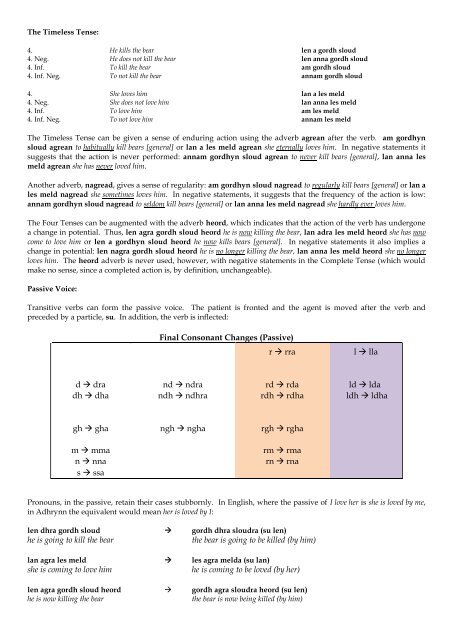Create successful ePaper yourself
Turn your PDF publications into a flip-book with our unique Google optimized e-Paper software.
The Timeless Tense:<br />
4. He kills the bear len a gordh sloud<br />
4. Neg. He does not kill the bear len anna gordh sloud<br />
4. Inf. To kill the bear am gordh sloud<br />
4. Inf. Neg. To not kill the bear annam gordh sloud<br />
4. She loves him lan a les meld<br />
4. Neg. She does not love him lan anna les meld<br />
4. Inf. To love him am les meld<br />
4. Inf. Neg. To not love him annam les meld<br />
The Timeless Tense can be given a sense of enduring action using the adverb agrean after the verb. am gordhyn<br />
sloud agrean to habitually kill bears [general] or lan a les meld agrean she eternally loves him. In negative statements it<br />
suggests that the action is never performed: annam gordhyn sloud agrean to never kill bears [general], lan anna les<br />
meld agrean she has never loved him.<br />
Another adverb, nagread, gives a sense of regularity: am gordhyn sloud nagread to regularly kill bears [general] or lan a<br />
les meld nagread she sometimes loves him. In negative statements, it suggests that the frequency of the action is low:<br />
annam gordhyn sloud nagread to seldom kill bears [general] or lan anna les meld nagread she hardly ever loves him.<br />
The Four Tenses can be augmented with the adverb heord, which indicates that the action of the verb has undergone<br />
a change in potential. Thus, len agra gordh sloud heord he is now killing the bear, lan adra les meld heord she has now<br />
come to love him or len a gordhyn sloud heord he now kills bears [general]. In negative statements it also implies a<br />
change in potential: len nagra gordh sloud heord he is no longer killing the bear, lan anna les meld heord she no longer<br />
loves him. The heord adverb is never used, however, with negative statements in the Complete Tense (which would<br />
make no sense, since a completed action is, by definition, unchangeable).<br />
Passive Voice:<br />
Transitive verbs can form the passive voice. The patient is fronted and the agent is moved after the verb and<br />
preceded by a particle, su. In addition, the verb is inflected:<br />
Final Consonant Changes (Passive)<br />
r rra<br />
l lla<br />
d dra nd ndra rd rda ld lda<br />
dh dha ndh ndhra rdh rdha ldh ldha<br />
gh gha ngh ngha rgh rgha<br />
m mma<br />
n nna<br />
s ssa<br />
rm rma<br />
rn rna<br />
Pronouns, in the passive, retain their cases stubbornly. In English, where the passive of I love her is she is loved by me,<br />
in <strong>Adhrynn</strong> the equivalent would mean her is loved by I:<br />
len dhra gordh sloud gordh dhra sloudra (su len)<br />
he is going to kill the bear<br />
the bear is going to be killed (by him)<br />
lan agra les meld les agra melda (su lan)<br />
she is coming to love him<br />
he is coming to be loved (by her)<br />
len agra gordh sloud heord gordh agra sloudra heord (su len)<br />
he is now killing the bear<br />
the bear is now being killed (by him)


